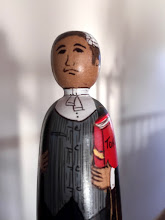The day Bob died Merle opened the suitcase for what she told herself would be the last time. With
her husband still beside her she set the cash tin on the sheet. Insider were her husband’s insignia, rising sun hat badge, wage book, tobacco tin, a dozen monochrome photographs and the letters bound together with string.
She
looked through the photographs. There was one she liked. Bob and a half dozen other soldiers and nurses on a tropical beach somewhere. They were
toasting the end of the war. Bob held his beer bottle high, a cigarette
dangling from his mouth. She smiled and put the photograph with the others.
Then she removed the tobacco tin that she had never opened.
Not that she hadn't tried but the lid was tight and the top was dented
in. She shook the tin as she had done before. There was no sound. In the past that had been enough and she had
returned to the letters and photographs. But this morning, with her husband
dead beside her, it would not be enough just to shake the little tin. This
morning she retrieved a teaspoon from the kitchen and worked it under the lid.
It was not easy for her but she persisted. ‘Bugger’ she said each time the handle of the
spoon failed to catch under the lip. But at last she did it.
Inside was a
folded envelope. She took it and pressed it flat on her lap. It was
addressed to her but had not been posted. The envelope was fragile, discoloured
and stained. Mud or blood was smeared across the back. The stamp had come away
leaving a brown square in the corner where the gum had perished. Inside
was one ragged edged sheet covered in her husband’s scrawl. In parts the ink
had ran. Something grey-green grew in the folds. Merle took a deep breath, adjusted
her spectacles and read.
My darling Merle, I love you so very very
much and wish like crazy that I was with you. Please forgive this shoddy writing.
Worse than usual I know. I have the shakes bad I’m afraid. Haven’t eaten or
slept for days and the fighting is hot.
The Jap are tough and don’t let anyone tell
you otherwise. Big buggers too. Six footers easy. Every one. They rally to a bugle call and scream like banshees when they attack. We kill ‘em but they keep on.
Silly bloody buggers. I don’t mind killing ‘em. Mostly. Rolling bombs down into
them is best. But some get through and you have to shoot ‘em Merle. It’s worst
in close. Hands and feet and teeth. So close you can taste ‘em. And you see
their eyes Merle. Before. And after.
They got through and split the brigade last night. Now
I’m back in a bloody hole by the track. Our mob behind and those buggers out
front. You can’t see em for the trees but they’re there.
Nights are worst. Bitter cold up here and you
can’t sleep. Last time I did a bloke was bayoneted next to me. He fell across
me and I left him there til dawn. I shouldn’t have Merle but his blood was
warm. I slept and that happened. But not since.
Come the day you see how it is and what
you’ve done. Everywhere the shot up fire lines and the dead. The valleys are
bad; the stench hangs in the thick air and sticks to you like mud. Then it’s
night again and the darkness is everywhere. And they’re in the trees Merle and
you have to kill them again.
I wish I was home Merle kicking up dust at
the Ekka. I wish I were. I do.
Merle folded the
letter and replaced it in the tobacco tin. She put the tin in the cash box, the
box in the case and the case in the cupboard. She looked at her husband and touched his face, shook her head and cried.
‘You stupid,
stupid, man,' she said.
Sunlight cut
across Bob's face making his whiskers glow silver. She kissed him one last time.
His face was warm in the sun. It was time now. She picked up the phone by the
bed and called the familiar numbers. Her daughter first and then the others.
They would want to see their father before the strangers took him away.




No comments:
Post a Comment